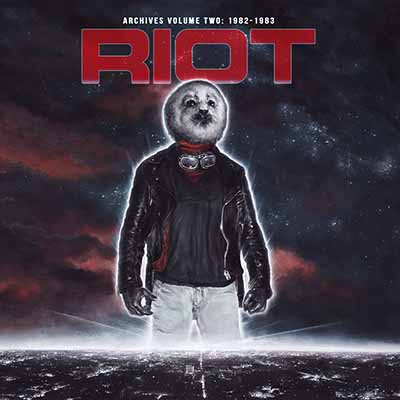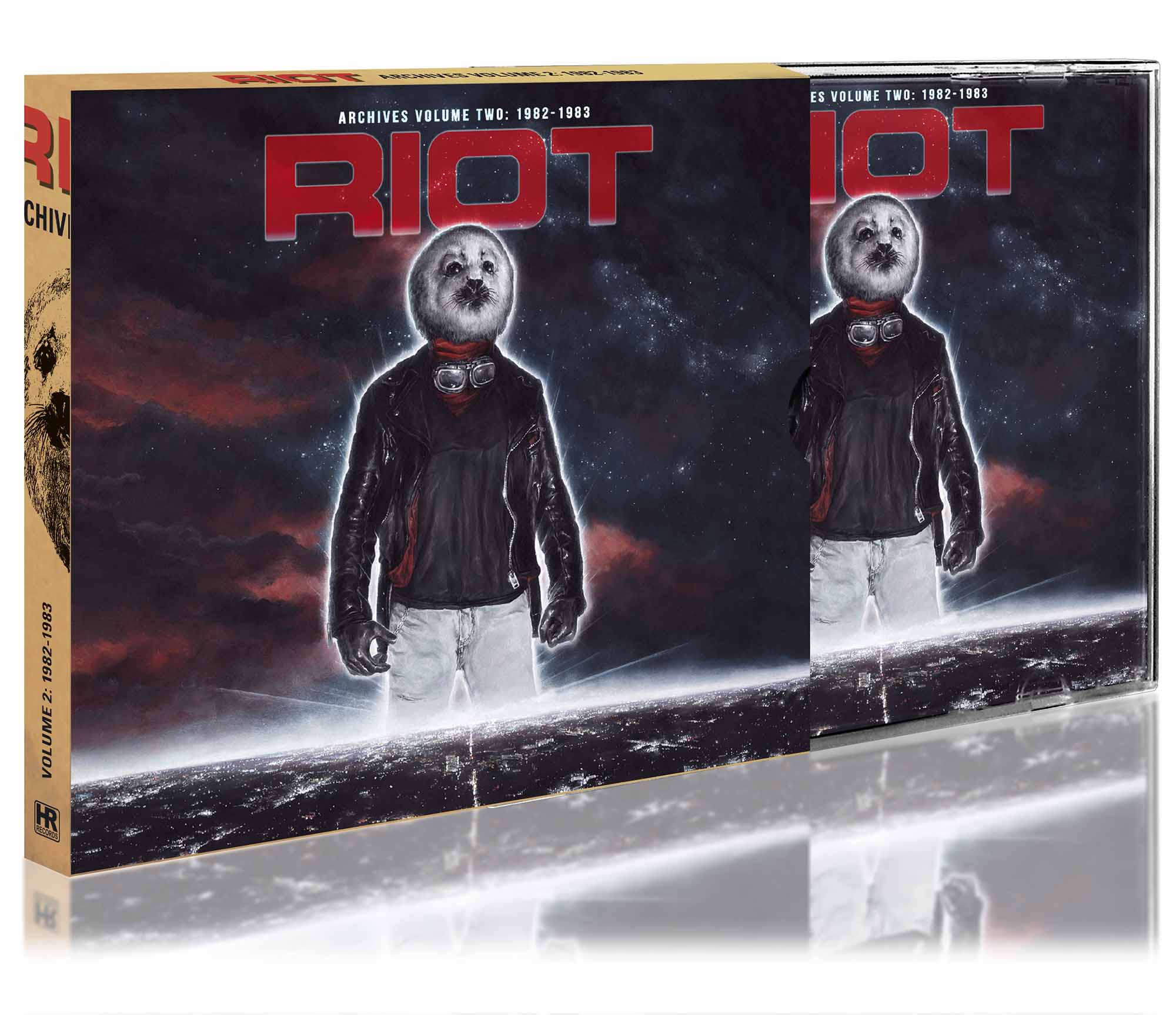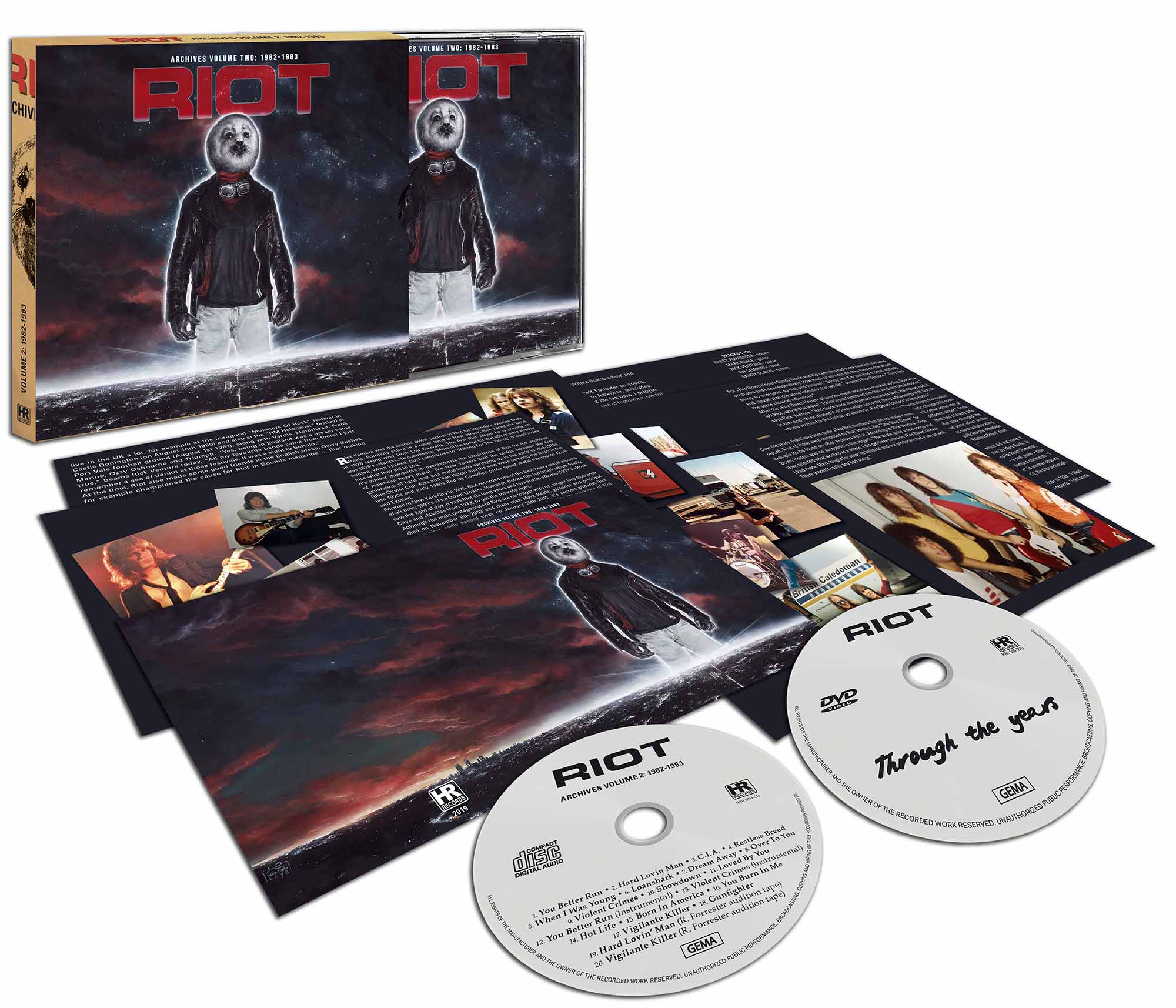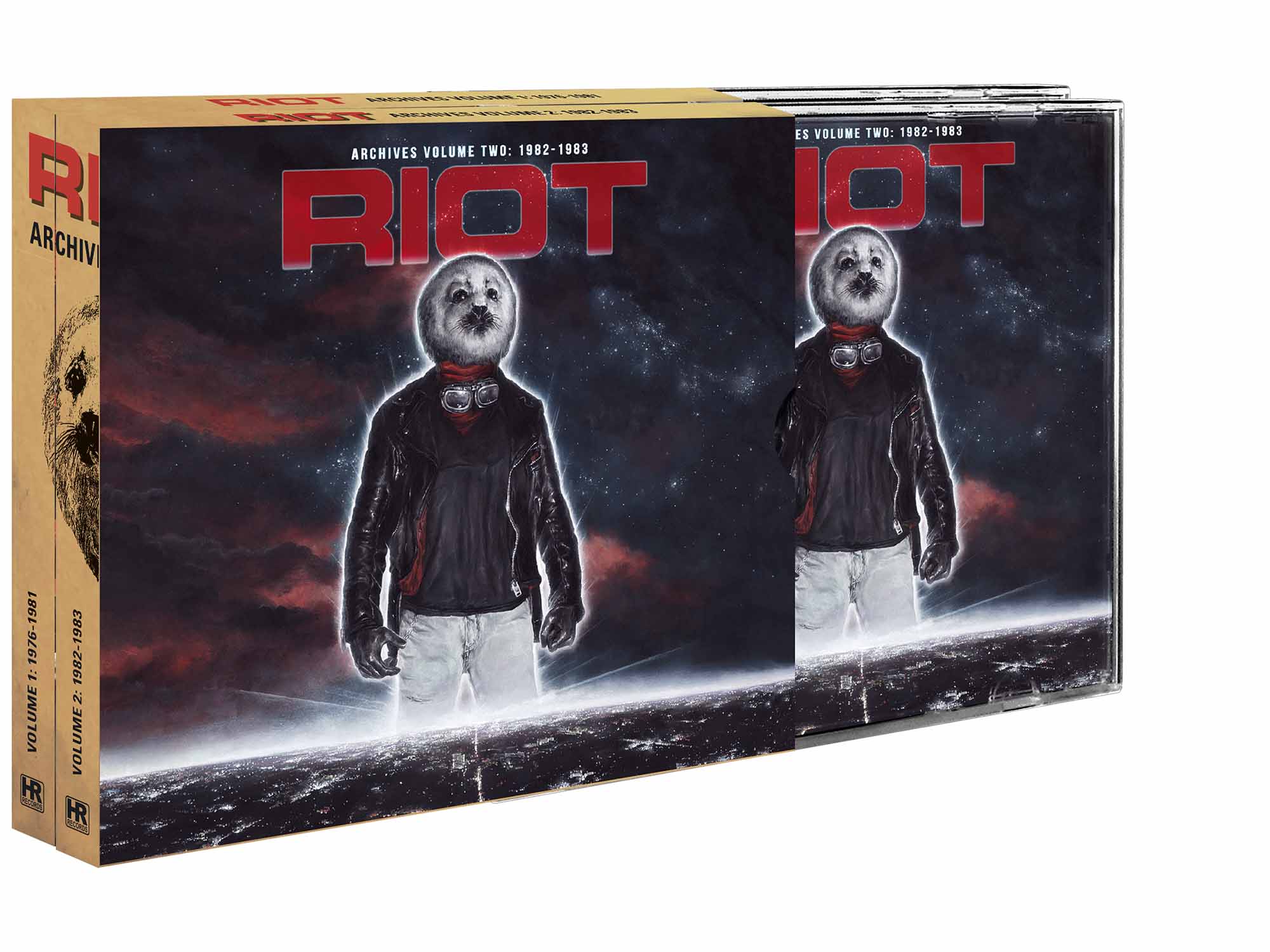 | ||||
| RIOT - Archives Volume 2: 1982-1983 CD+DVD | |
HRR 554 CD, slipcase, bonus DVD | |
| Tracks 1–18 RHETT FORRESTER - vocals MARK REALE - guitar RICK VENTURA - guitar KIP LEMMING - bass SANDY SLAVIN - drums | Tracks 19–20 RHETT FORRESTER audition demo Unknown lineup |
| 01 You Better Run 02 Hard Lovin Man 03 CIA 04 Restless Breed 05 When I Was Young 07 Dream Away 08 Over to You 09 Violent Crimes 10 Showdown 11 Loved by You (8 Minute Version) 12 You Better Run (Instrumental) 13 Violent Crimes (Instrumental) 14 Hot Life 15 Born in America 16 You Burn in Me 17 Vigilante Killer 18 Gunfighter 19 Hard Lovin Man (Audition) 20 Vigilante Killer (Audition) | |
AVAILABLE | |
restored and mastered by Patrick W. Engel at Temple of Disharmony
Rick Ventura was the second guitar partner in Riot for legendary axeman Mark Reale. Formerly active in a cover band in New Jersey, Rick joined the band in 1978 taking over from Lou Kouvaris. The first Riot album he is playing on was 1979’s »Narita«. He comments: “Most of the songs for that album were already written, when I joined, but I contributed to ‘Waiting For The Taking’. It wasn’t very nice what they did to Lou.”
It’s almost impossible to overestimate the importance of Riot for the evolution of American heavy metal. The New Yorkers built the bridge between the first generation of hard rock and metal bands springing up in the early to mid-1970s (Blue Öyster Cult, Kiss and Van Halen) and the new wave carrying the torch in the late 1970s and early 1980s (led by Canadian proto speed metal merchants Anvil and Exciter).
Formed in New York City in 1975, Riot recorded one of the best heavy metal albums of all time: 1981’s »Fire Down Under«. However, before this landmark album finally saw the light of day, it took Riot six long years and two studio albums (1977’s »Rock City« and »Narita« from 1979) to get the formula right.
Although the main protagonists of Riot are no longer with us, singer Guy Speranza died on November 8th 2003 and main man Mark Reale, guitarist and principal songwriter, sadly passed away on January 25th 2012, it’s second guitarist Rick Ventura who is able to give us some valuable insights into the workings of Riot Mark II.
“I lived two blocks from Mark Reale,” describes Rick his first encounter with the band’s legendary guitarist. “I would hear loud guitar playing coming from his house and would say ‘who the hell is this?’ I finally met him and we became friends. I wound up playing in Riot when they were doing covers.”
After having joined the band, Rick was contributing to the songwriting as well, also for 1981’s landmark »Fire Down Under« record: “My partnership with Mark Reale was good, we were always into getting a good sound and the music tight. He mostly wrote songs with Guy Speranza though.”
When »Fire Down Under« was refused by Capitol Records in America, it was England that sort of became a second home for New York's finest. Riot played live in the UK a lot, for example at the inaugural “Monsters Of Rock” festival in Castle Donington (on August 16th 1980) and also at the “HM Holocaust” festival at Port Vale football ground (August 1st 1981), along with Vardis, Motörhead, Frank Marino, Ozzy Osbourne and Triumph. “Yes, being in England was a dream come true,” beams Rick Ventura today. “All my favourite bands came from there! I just remember a sea of denim at those festivals. It was a sight to behold.”
At the time, Riot also made some good friends in the English press, Garry Bushell for example championed the cause for Riot in Sounds magazine … Riot making some waves in England (at the height of the glorious NWOBHM) was probably instrumental in getting Elektra to sign the band and finally putting out »Fire Down Under« (instead of Capitol Records). Rick Ventura thinks so too: “Yes, many thanks to all. We needed all the help we could get. There was a good buzz about the band in England, our live performances at the time were so energetic. No way did we know that »Fire Down Under« would become such a popular album. We just wrote and played what we felt. It wasn’t until decades later till it really hit me.”
Over the years, there have been quite a few Riot numbers that did not make it onto record. A lot of those were composed by Rick Ventura, like “One Step Closer” for example (to be found on »Riot Archives Vol.1«). According to Rick Ventura, »Fire Down Under« was no exception in this regard: “We wrote quite a few songs and then selected what worked as a whole. I did get three tunes on »Fire Down Under«. I had more. Mark fought for what he believed and our producers had a say as well. There weren’t really any bad songs.”
For »Fire Down Under« Sandy Slavin and Kip Lemming had come new into the band on drums and bass respectively. How much of an input did they have on the album being so energetic, so fast and furious? “Sandy and Kip just had a great attitude and played with the same intensity that we did,” answers Rick Ventura. “They had the same musical influences.”
After the »Fire Down Under« album the metal world was shocked as Guy Speranza left Riot, why did he leave? “I think it just frustrated him that we didn’t break sooner,” says Rick Ventura. “And there were management issues as well. He always had it in him and I think missed it. If I remember correctly, there a few songs with Guy on vocals written for the follow-up album to »Fire Down Under« lurking about.”
When Rhett Forrester finally joined Riot for the »Restless Breed« album, the musical direction of the band changed quite drastically. Was this stylistic change only down to Rhett joining and contributing to the songwriting or was it rather some sort of “natural progression” for Riot in general? “Well, he was a different singer,” finds Rick Ventura. “There was no choice, Guy left, we adapted. Rhett had a bluesy side and a lot of swagger.” Of course, Rhett Forrester joining Riot also changed the dynamics within the band. According to Rick Ventura, this had some effect on the actual songwriting process as well: “It did change a bit, not as much collaborating. I always wrote my songs and presented them to the band. I really like the »Restless Breed« record. It’s a bit bluesier, stuff like ‘Loved By You’ and ‘Restless Breed’ itself. We had a different singer and wrote what worked with Rhett.”
On »Riot Archives Vol.2« there is a song called “Hot Life”, which did not make it onto any Riot album, Rick Ventura believes it has been written by Mark Reale. In addition to that, the record also contains the original auditions for Rhett Forrester, with him singing “Hard Lovin’ Man” and “Vigilante Killer” – a real jewel – plus an extraordinary 8-minute version of “Loved By You”. Rick Ventura comments: “I know. It’s so cool! Just one of those things.” “You Better Run” is another obscure song from the Riot archives, it has a bit of an AC/DC feel about it, the chorus though is quite AORish in nature, with nice guitar work all around.
»Restless Breed« from 1982 was followed by »Born In America« in 1983. “I liked »Restless Breed« a bit more,” compares Rick Ventura the two records. “I felt some of »Born In America« was a bit contrived, though I do like 'Where Soldiers Rule' and 'Vigilante Killer'”.
Comparing the different eras with Guy Speranza and Rhett Forrester on vocals, Rick, whose last album with the band was indeed »Born In America«, concludes: “Well, certainly the Guy era was decisive, that’s what got the fan base. I enjoyed both. Rhett was fun to work with. In the end I left Riot because of frustration, overall direction and management issues. No major label wanted us. It just wasn’t the same Riot anymore.”
Matthias Mader


